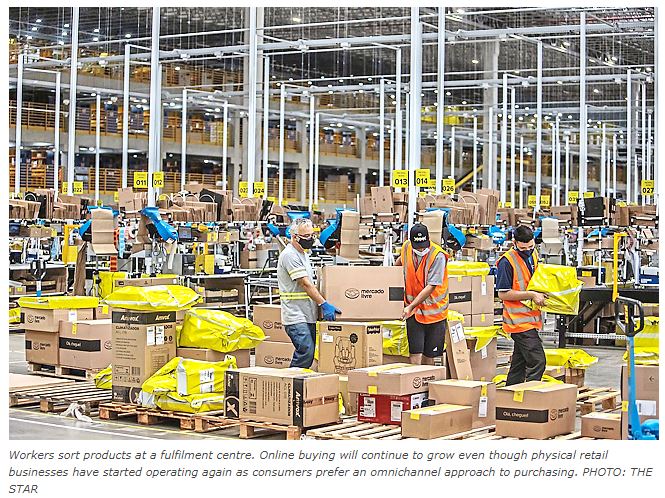Malaysia: E-commerce continues to flourish in 2021
THE STAR – The e-commerce industry has continued to flourish in 2021, growing at an accelerated pace due to the Covid-19 pandemic, and this in turn has helped many businesses, especially micro, small and medium enterprises (MSMEs), to stay afloat.
“It has been a very positive year for the industry,” Zalora chief executive officer Gunjan Soni said. Zalora, part of Global Fashion Group, is Southeast Asia’s leading fashion and lifestyle e-commerce player.
According to the Department of Statistics Malaysia (DOSM), the country’s e-commerce income surged 23.1 per cent year-on-year (y-o-y) to MYR801.2 billion in the first nine months of this year.
For the third quarter, e-commerce income was up 17.1 per cent y-o-y at MYR279.0bil. In terms of quarter-on-quarter growth, it maintained a positive trend with 4.3 per cent.
One of the driving forces for this trend was the middle class in Malaysia, which has the highest per centage of digital natives in South-East Asia, at 88 per cent, Soni told Bernama in an interview.
These 22 million digital natives (in Malaysia), who spend close to nine hours online daily, play a key role in driving the growth of Malaysia’s e-commerce sector,” she explained.
Soni said e-commerce has also helped to cushion against unemployment not only in Malaysia but also other countries in Southeast Asia.
She said Zalora is proud to be able to support the Malaysia Digital Economy Corp’s (MDEC) MSMEs e-commerce campaign, which reached thousands of new businesses.
“During the pandemic, more Malaysians have become e-commerce entrepreneurs and are providing job opportunities,” the National Tech Association of Malaysia (Pikom) said.
Based on DOSM data, 1.2 million people were employed in the information and communications technology (ICT) industry last year, representing 7.7 per cent of total employment in the country.
Although the growth of e-commerce may slow down in the short term as physical retail businesses have started operating again, Pikom said consumers prefer to have an omnichannel approach to purchasing.
It is, however, expected to re-accelerate in the medium to long term as consumers have become comfortable to the new normal of buying online.
MDEC chief executive officer Mahadhir Aziz advised entrepreneurs to adopt e-commerce to stay relevant in this challenging time, as well as expand their business beyond local shores to regional and international markets via cross-border e-commerce.
“Improve (your) capability and capacity to stay competitive. E-commerce is a very dynamic sector; new business models and new value propositions can be created by adopting new MarTech (marketing tech) and other digital tech or business processes digitalisation,” he said.
To help the entrepreneurs and businesses with the transition towards e-commerce, MDEC’s #SayaDigital Movement offers initiatives such as Go-eCommerce and eUsahawan that equip entrepreneurs and businesses with the right tools to go to the next level.
He said the programmes offer business management, financial management, search engine optimisation guidance, copywriting and guidance to expand and share knowledge with other digital entrepreneurs.
On the creative industry, Mahadhir said 2021 has been a year of challenges both in terms of business continuity and achievements as demand on digital content remained on the uptrend.
“We foresee that the creative industry will exceed the average annual growth rate of 3.6 per cent moving forward,” he said.
As for the digital games sector, the latest market research by Newzoo, an industry market research organisation, projected that the games market in Malaysia would generate revenues of USD961 million in 2021 – up 6.7 per cent y-o-y – with smartphone games producing around 60 per cent of revenues.
Mahadhir said the Malaysian government strongly supports the local digital creative industry, with policies in place such as the Malaysian National Creative Industry Policy (DIKN) and the Malaysia Digital Economy Blueprint (MyDigital).Meanwhile, MDEC’s initiatives for the industry, based on the Digital Content Ecosystem policy framework, include Kre8tif, LEVEL UP, Digital Content Creators Challenge, Digital Content Grant and incubation programmes.
“These support systems are readily available for our digital content creators to take advantage of and produce work that could propel them to international renown such as (animated TV series) Upin & Ipin, BoBoiBoy, and Saladin, among others,” he said.
On top of that, the Digital Content Grant has also benefitted digital creators as it supports local companies in developing, producing, co-producing and marketing their digital content in animation, digital games, and interactive media content.


 Thailand
Thailand




